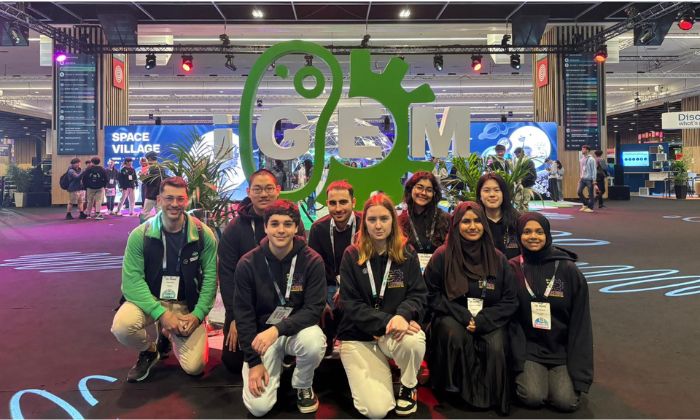iGEM student team wins gold in Paris
15 Nov 2024
An eight-strong team of Manchester students has scooped a gold medal at the 2024 iGEM (International Genetically Engineered Machine) Jamboree in Paris, with support from Humanities’ Schools.

For the twelfth consecutive year, a team from the University of Manchester has taken home gold at the annual iGEM competition, an international contest which sees students collaborate to solve real-world problems using synthetic biology.
Supervised by Professor Eriko Takano and Professor Rainer Breitling from the Manchester Institute of Biotechnology, the team’s interdisciplinary project ‘E.lectrode’ explored engineering bacteria for improved human-machine interfaces for prosthetics users. The project was financially and logistically supported by the SoSS’s Department of Social Anthropology and SALC, with AMBS helping the team to explore the social and economic implications of their ideas.
Amongst the eight team members was Linguistics and Social Anthropology undergraduate student Zainab Atique-Ur-Rehman, who took the roles of human practices lead and wiki developer.
Zainab said:
“I can honestly say that participating in iGEM was one of the most stimulating and exciting opportunities I’ve participated in so far at university. Being in a team that was as diverse as ours in terms of not only our backgrounds but also our academic interests is something I’m going to miss a lot.”
This year, the team also aimed to redefine integrated human practices – how people’s work affects the world and how the world affects their work – in iGEM by looking internally at what truly makes an iGEM project: the iGEMers themselves. They wrote diaries to explore how their thoughts, feelings, and biases influenced both themselves and the team dynamic, and shaped the direction of the project. In doing so, they became the first iGEM team to show that, by taking account of their impact on what they were investigating, they could think critically about the ethical, social, and cultural impacts of their work.
Zainab added: “I was able to use what I learned in my degree to do something different from previous iGEM projects, and it paid off. Winning gold was such a huge achievement. I felt proud to represent those disciplines on a global stage.”
